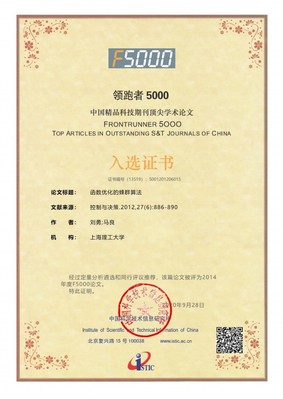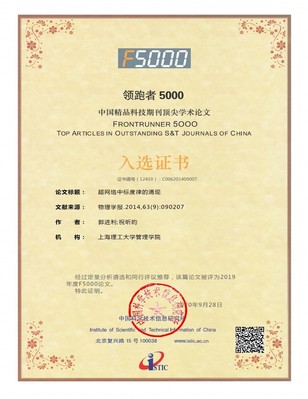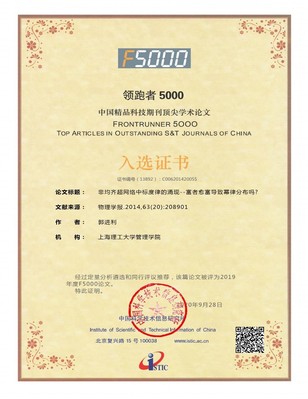Recently, business school(BS) associate professor Liu Yong and Professor Ma Liang’s paper “Bees algorithm for function optimization” which was published in Chinese elite science and technology journal “Control and Decision”(EI) in 2012, volume 6, entered “Forerunner 5000-Chinese elite science and technology journals top academic papers database”. Professor Guo Jinli’s two papers “Emergence of scaling in hyper networks” and “Emergence of scaling in non-uniform hyper networks—–does “the rich get richer” lead to a power-law distribution?” published in Chinese elite science and technology journal, Chinese authoritative physics journal “Acta Physica Sinica”(SCI) in 2014, volume 9 and 2014, volume 20, entered “Forerunner 5000-China elite science and technology journals top academic papers database”.
The paper “Bees algorithm for function optimization” proposed a new bees algorithm based on the foraging characteristics of bees. In this method, the searching behavior was guided by the individual previous foraging experience and shared information among the swarm. The algorithm kept the balance between exploration and exploitation by the individual adjustment factor and the difference factor between the individual and group. The implementation techniques of the algorithm were given and the convergence of the algorithm was analyzed by using compression mapping theorem. The test results showed the good performance of the algorithm by optimizing typical benchmark functions. The paper provided good reference for artificial intelligence algorithm research, achieved stage results of BS’s building high-level university objective, and reflected the research features of the two Grade A Doctoral Program disciplines of System Science, and Management Science and Engineering. The paper “Emergence of scaling in hyper networks” proposed a unified model for hyper networks and complex networks, and studied the evolution mechanisms of scale-free hyper networks and the topological properties of the hyper network. The paper had analyzed the proposed model and calculated the stationary average hyper degree distribution of the hyper network by using a Poisson process theory and a continuous technique. The analytical result agreed well with the simulation. It was shown that the hyper degree distribution of the dynamic model followed a scale-free law. This paper not only integrated the hyper network model, in which one new node formed an edge with some old nodes, and the hyper network model, in which some new nodes formed an edge with one old node, but also integrated the scale-free model in complex networks. The paper “Emergence of scaling in non-uniform hyper networks—–does “the rich get richer” proposed a non-uniform hyper network model with a nonlinear preferential attachment, and studied the evolving mechanism and topological properties of the hyper networks. The paper analyzed the model by using a Poisson process theory and a continuous technique, and give a characteristic equation of hyper degrees. The paper obtained the stationary average hyper degree distribution of the hyper networks by the characteristic equation. The analytical result showed that the hyper networks has a phenomenon of “the rich get richer”, and it accorded well with the simulation. It was shown in this paper that the hyper degree distribution of the dynamic model exhibited a stretched exponential distribution with the increase of the hyper network size. It proved that “the rich get richer” did not necessarily induce a power-law distribution.
“Forerunner 5000-China elite science and technology journals top academic papers database(F5000)” was the demonstration database of domestic new papers since 2012 by state authoritative scientific and technological information research institute-China's scientific and technological information research institute. The platform aims to promote the “China elite science and technology journals” brand value , consolidates elite journals’ academic influence, build demonstration platform for elite journals highest academic level and promote academic exchange and knowledge communications. F5000’s paper selection is using both qualitative and quantitative(citation over past 5 years) method based on “Chinese Sci-tech Paper and Citation Database(CSTPCD)” to evaluate academic journals’ quality and influence, select elite journals and choose less than 20 papers in the past 5 years for each elite journal as the F5000 chosen papers. The chosen papers need to be the top 1% highly-cited papers of its discipline, to be original scientific research or technology innovation and can reflect the highest academic level of journal’s discipline.





